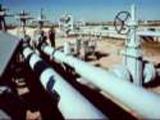|
|
TODAY.AZ / Business
Moscow proposes oil transportation deal to Azerbaijan
22 February 2006 [14:51] - TODAY.AZ

"A proposal involving a new option for long-term cooperation has been forwarded to the Azerbaijani side," Viktor Khristenko told a news conference.
Khristenko said Moscow was aware of difficulties the Baku-Novorossiisk pipeline deal may face after the commissioning of the Baku-Tbilisi-Ceyhan (BTC) pipeline later this year, RIA Novosti informs.
The Baku-Novorossiisk pipeline pumped 4.1 million metric tons (82,000 bbl/d) of crude last year, a 50% increase on the average annual amount of 2.7 mln mt for the previous few years, the minister said.
Azerbaijan's Industry and Energy Minister Natik Aliyev said Tuesday that the country planned to transport over 3 mln mt (around 60,000 bbl/d) of crude via the Baku-Novorossiisk pipeline to southern Russia, less than last year.
Aliyev's estimates suggest a possible drop of up to 27% on the 2005 level. The amount of oil to be transported from the country will largely depend on the Baku-Tbilisi-Ceyhan pipeline, plan to be completed May 27 of this year, the minister said.
Aliyev explained the unpredictability of the figures by the fact that Azerbaijan had no obligations for oil supplies through the Baku-Novorossiisk pipeline as deliveries are based on orders linked to the fuel balance of the country's energy complex, as well as on the production and refining capacity of Azerbaijani companies.
According to a bilateral agreement signed on January 18, 1996, a maximum of 5 million tons per year (100,000 bbl/d) could potentially be transported via the Baku-Novorossiisk pipeline.
The BTC pipeline will run 1,100 miles, from the Sangachal terminal near Baku, Azerbaijan's capital, through Georgia, to the Turkish Mediterranean port of Ceyhan, carrying around 1 mln bbl/d.
According to the minister, crude production in Azerbaijan had grown by 6.65 mln mt in 2005, to a total of 22.2 mln mt (446,000 bbl/d), representing a 43% year-on-year increase.
Azerbaijan has long been capitalizing on its substantial hydrocarbon resources, which are mainly concentrated in the Caspian Sea basin. Western investment in the country's energy sector has helped Azerbaijan's economic revival since it gained independence after the breakup of the former Soviet Union. Azerbaijan's GDP per capita reached an estimated $4,600 in terms of purchasing power parity in 2005, which is significantly higher than that of some other former Soviet republics, such as Uzbekistan ($1,900) and Kyrgyzstan ($1,800).
URL: http://www.today.az/news/business/23557.html
 Print version
Print version
Connect with us. Get latest news and updates.
See Also
- 14 January 2026 [19:22]
bp introduces innovative drilling fluid recycling in Azerbaijan, Georgia, and Türkiye - 14 January 2026 [18:38]
TotalEnergies and Bapco Energies launch BxT Trading joint venture in Bahrain - 14 January 2026 [12:57]
EIA forecasts gradual decline in Azerbaijan’s oil and liquid hydrocarbons output by 2027 - 14 January 2026 [12:39]
Azerbaijan to rebuild 10 railway stations along Nakhchivan Line - 14 January 2026 [10:44]
Train shipments between Azerbaijan and Iran unaffected by ongoing clashes in Iran - 13 January 2026 [12:44]
Over 54 bcm of gas delivered to Europe via TAP as Azerbaijan–Italy energy ties expand - 13 January 2026 [10:00]
Azeri Light crude price falls at Ceyhan, rises in Italy - 12 January 2026 [12:49]
ASCO’s “Shirvan” crane vessel undergoes major overhaul - 12 January 2026 [11:57]
Azerbaijan’s green energy push opens new opportunities for Dutch partnership - 12 January 2026 [11:38]
Azerbaijan to showcase national vision at Expo 2027 Yokohama
Most Popular
 Azerbaijan launches industrial copper mining: Demirli opens up new opportunities
Azerbaijan launches industrial copper mining: Demirli opens up new opportunities
 Terrorist Vladimir Solovyov threatens Armenia and Central Asian countries with war
Terrorist Vladimir Solovyov threatens Armenia and Central Asian countries with war
 Defense Ministry, Military Prosecutor sign plan to prevent violations in armed forces
Defense Ministry, Military Prosecutor sign plan to prevent violations in armed forces
 Azerbaijan’s green energy push opens new opportunities for Dutch partnership
Azerbaijan’s green energy push opens new opportunities for Dutch partnership
 Trade is changing logic of Azerbaijan-Armenia relations: market before and after
Trade is changing logic of Azerbaijan-Armenia relations: market before and after
 Iran protests death toll reportedly surpasses 500
Iran protests death toll reportedly surpasses 500
 President Ilham Aliyev chairs meeting on state programme to improve water supply and sanitation systems in Baku
President Ilham Aliyev chairs meeting on state programme to improve water supply and sanitation systems in Baku
